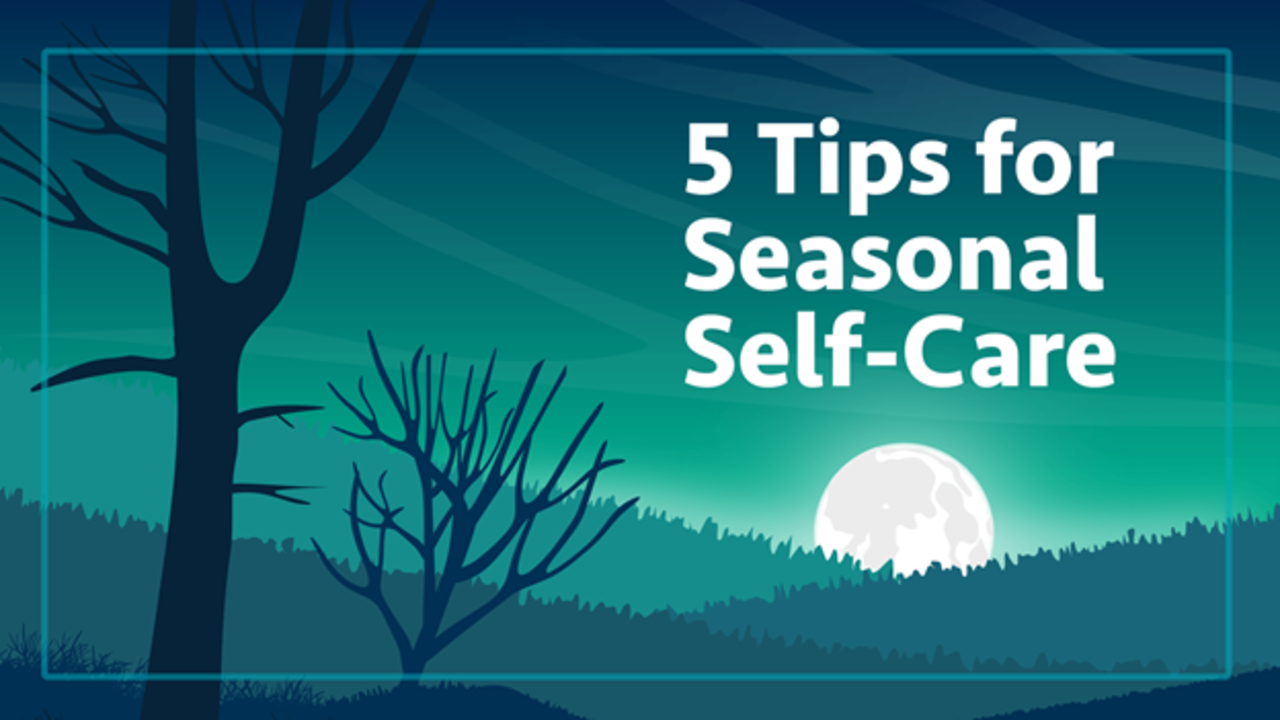5 Tips For Seasonal Self Care
Oct 19, 2023
Winter is here, and that means long nights, less sunlight and disturbed sleeping patterns. Thankfully, there are a few steps you can take to combat the effects of winter and regain control of your mind. Here are 5 tips for seasonal self-care.
Tip 1: Exercise more.
Shown to be effective in the fight against non-seasonal depression, exercise is now proving itself useful as a tool to lessen the winter blues as well.[1] While it doesn’t matter what time of day you get moving, research suggests that it’s best to avoid nighttime exercise as that can interfere with sleep patterns. For an added bonus, try to include some outdoor activities in your regimen. The sunlight and fresh air will give you an extra energy and mood boost. Although it might be difficult to get motivated during the gloomier months, try focusing on the immediate step in front of you in order to get going. For example, instead of thinking about running a mile on a cold day, focus on changing into your fitness clothes and running shoes. With each step forward, your goal becomes easier to achieve.
Tip 2: Eat right.
In addition to cutting down on mood destroyers like sugary and fried foods, you can focus on eating mood-building foods like spinach, quinoa, brazil nuts, and lentils. Each of these foods contain important vitamins and minerals that have been shown to provide energy, boost serotonin, and elevate mood.[2] Although it’s often tempting to binge on rich, carby comfort foods in order to get a quick lift, be mindful to select whole food sources of complex carbohydrates (brown rice, oatmeal, sweet potatoes with the skin on) instead of processed sources (white pasta, sugary deserts, peeled white potatoes). Since protein can block the body’s ability to turn tryptophan into serotonin, research suggests that eating one high fiber, whole foods carbohydrate meal per day without a protein source (for example, oatmeal with raisins for breakfast or a vegetable stir fry with brown rice for dinner) can be beneficial.[3],[4],[5] Everyone’s body is different. Experiment a little and see what works for you.
Tip 3: Mind your sleep.
Changing seasons can disrupt melatonin production, leading to insomnia and oversleeping. Try to set a regular sleep schedule and stick to it. This will ensure that you are awake to take advantage of the early morning sunshine (which has shown to be beneficial for mood), and that you start to get sleepy when it’s time for bed. Consider adding sleep rituals to your nightly routine: take a warm bath, listen to soothing music, turn off your devices at least 1 hour before bedtime, make sure that your environment is a few degrees cooler (between 60 and 67°F, or 15 to 19°C is recommended).[6]
Tip 4: Get spicy.
There’s a reason why certain herbs and spices have been traditionally used for cooking during the winter months. Their flavors and aromas can give us a natural health, energy and mood lift when we need it most.[7],[8],[9],[10] Try incorporating one or more of these ingredients in your meals or tea blends: ginger, cinnamon, nutmeg, cloves, orange peel, saffron, turmeric and rosemary. If you’re a less adventurous eater, don’t worry. You can still enjoy the beneficial properties of herbs and spices by using an essential oil diffuser. Just be mindful not to diffuse orange oil near bedtime as it can keep you awake.
Tip 5: Lighten up.
Most studies on Seasonal Affective Disorder (SAD) recommend adding some form of additional light to your waking hours.[11] You can do this by using a light box for 30 minutes per day or more. SAD lightboxes can be purchased online from major retailers such as Costco and Amazon (it is recommended to purchase one that offers at least 10,000 lux exposure; by comparison, a sunny day provides 50,000 lux). If you’re not ready to purchase a lightbox, try shifting your schedule so that you get more outside/natural light time during peak daylight hours (earlier in the day/morning is best).[12]
If tips 1-3 look familiar, that’s because they’re Keystone Habits that we’ve written about before. For more information on how they can affect literally everything else in your life, watch this video:
About the Author
Sandra McDowell, MA, PCC, CPHR, SHRM-SCP
As the founder and voice behind eLeadership Academy™, Sandra McDowell helps leaders and organizations increase performance and well-being by leveraging insights from cognitive science to harness the untapped power of the brain.
Sources:
[1] https://www.ncbi.nlm.nih.gov/pmc/articles/PMC3004726/
[2] https://kriscarr.com/blog/seasonal-affective-disorder-food/
[3] https://www.amazon.com/Secrets-Serotonin-Revised-Cravings-Elevates/dp/0312375123/ref=cm_cr_arp_d_product_top?ie=UTF8
[4] https://bebrainfit.com/serotonin-foods/
[5] https://news.mit.edu/2004/carbs
[6] https://www.healthline.com/health/healthy-sleep/how-to-fix-sleep-schedule#keep-it-cool
[7] https://www.ncbi.nlm.nih.gov/pmc/articles/PMC6532192/
[8] https://www.health.harvard.edu/blog/21-spices-for-healthy-holiday-foods-2020120421550
[9] https://www.ncbi.nlm.nih.gov/pmc/articles/PMC5575645/
[10] https://www.tasteofhome.com/collection/ingredients-to-boost-your-mood/
[11] https://www.health.harvard.edu/mind-and-mood/shining-a-light-on-winter-depression
[12] https://psychcentral.com/lib/treatment-for-seasonal-affective-disorder/


